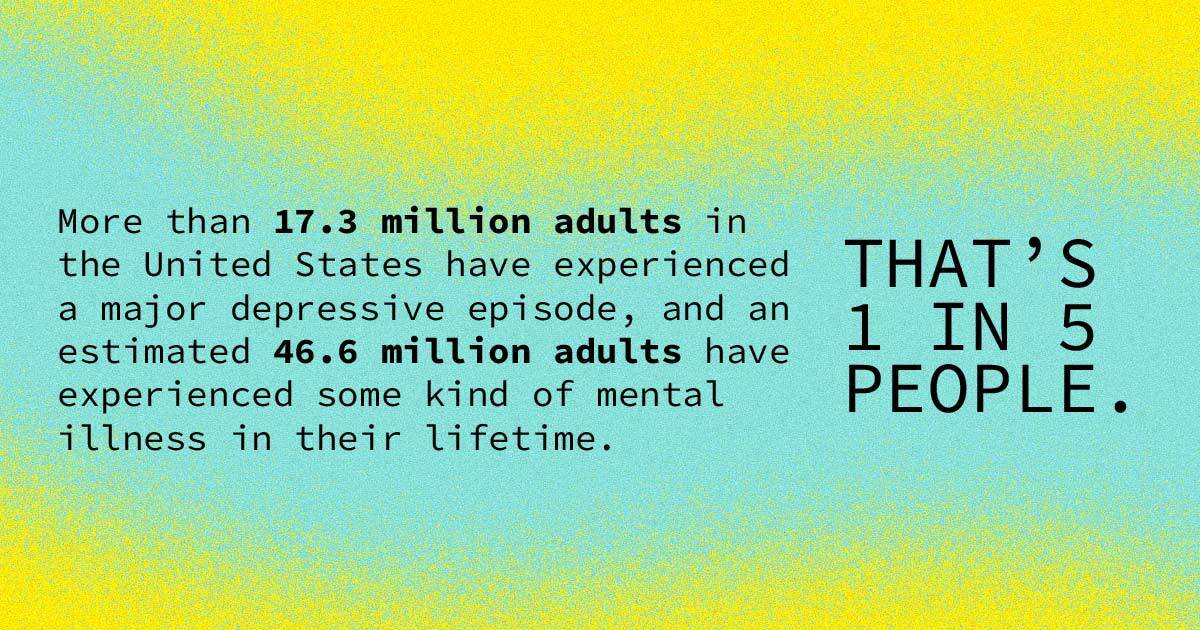This piece briefly mentions the topic of suicide. Please use your discretion.
There’s this notion that depression is this quiet insidious thing lurking under flickering streetlights and waiting in dark alleyways while smoking a cigarette. Meaning, we believe mental illness is something that lives only in the peripherals of our society. We recognize it’s a problem—it is a problem—but it’s buried beneath years of grime and abuse and neglect. Society tells us there is too much of it to tackle, that there are more pressing issues at hand—and we could never afford to clean up the entire city anyway.
So how do we, the ones who pass by the alleys and rely on the streetlights, navigate a world where we’re told it’s not important enough? More than 17.3 million adults in the United States have experienced a major depressive episode, and an estimated 46.6 million adults have experienced some kind of mental illness in their lifetime. That’s 1 in 5 people. With the pandemic and quarantine restrictions, many experts anticipate these numbers to only grow. Yet we continue to fail to address these concerns with the level of urgency and compassion that is needed. There’s still a lack of accessible and plentiful resources, continued social stigma against those who experience mental illness, and widespread misinformation confiscating the problem.

As someone who has suffered from depression for almost 15 years, mental illness has always worn a red dress. It shows up late to the party, laughing. Even though it never sits down, it somehow takes up all of the space. No matter where you are in the room, you can always find it. For me, I have never been able to ignore my depression for long. It appears in my happiest moments and stays on the coldest, loneliest nights. Yet every day that I go to work or interact with friends, I have to pretend that it isn’t there. That I don’t see it, or know it, or love it. This, of course, is the side of mental illness we can’t bear to understand. How could anyone love or need or hold onto something so tightly, even when it costs them their life?
When I was first diagnosed with depression, my doctor prescribed me antidepressants and I started attending therapy on a regular basis. I told my mother that I wanted my father to know, and when I told him about this thing that had caused me so much pain, he laughed. He said, “pills are for crazy people, you don’t need them.” I remember leaving his house in tears and telling my mother that I never wanted to see him again. She told me that once, a long time ago, my father tried to kill himself in his parents’ garage.
How can we pretend this beacon in a red dress doesn’t exist? That it isn’t significant and worthy of attention? The problem is only growing, and we just keep putting it off for the next generation to deal with. We have to acknowledge that these dark alleyways, these flickering streetlights and graffitied buildings, are still part of our city. They exist here and now, and can’t be pushed to the fringes. People are dying and mental illness is wearing a bright red dress, laughing the loudest, hoping there will be a day when someone asks it to sit down.
Depression has a way of making us feel incredibly isolated. We’re here to remind you of the truth that you are not alone. We encourage you to use TWLOHA’s FIND HELP Tool to locate professional help and to read more stories like this one here. If you reside outside of the US, please browse our growing International Resources database. You can also text TWLOHA to 741741 to be connected for free, 24/7 to a trained Crisis Text Line counselor. If it’s encouragement or a listening ear that you need, email our team at [email protected].
Tara
Kara this blog post was amazing! I want to start off by saying that I am so sorry for what you have gone through with your challenges with depression. I thought it was great how you referred to depression as “wearing a red dress”. So many people struggle with this every day, and others don’t understand. There are some days where I have depressive episodes and I don’t have the motivation to do anything. I often feel like my friends who don’t suffer from this will never understand me or how I feel. We have to stop putting these struggles off and we need to start facing them so that this issue doesn’t continue from generation to generation. You made a great point when you said that people are dying from mental illnesses, and it’s still wearing a red dress waiting to be asked to sit down. Thank you for sharing this and I feel that those who don’t suffer from mental illness may get a better understanding of what it is and how it is after reading this blog.
Helen
I’ve struggled with depression ever since I can remember. Wish there was an easy answer. Life is getting worse these days
TWLOHA
Depression does a very good job of convincing us things won’t or can’t get better. And we’re truly sorry that things seem and feel like they’re only getting worse. We hope that knowing you are not alone and that there’s always the possibility for things to change offers you even an ounce of hope. Please don’t hesitate to reach out to us ([email protected]) if you need/want the space to share, connect, or ask for support.
We’re glad you’re here, Helen, and we’re grateful for your honesty.
With Hope,
TWLOHA